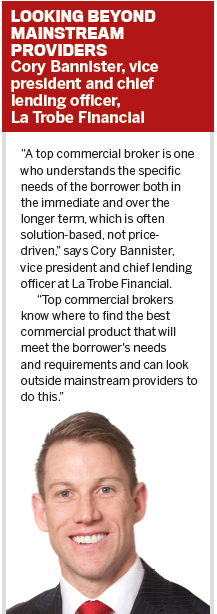Why embark on a diversification strategy now, and what's it worth to your organisation? Why embark on a diversification strategy now, and what's it worth to your organisation?
.jpg)
Why embark on a diversification strategy now, and what's it worth to your organisation?
“Should I diversify?” is a question that’s on the lips of nearly every broker around the country at the moment. It’s no surprise either. With numerous housing markets taking a downward turn and the increased scrutiny in the wake of the royal commission, the motivation to look for new business outlets has gone far beyond idle curiosity.
The good news is that diversification doesn’t mean abandoning your core knowledge base in favour of totally uncharted territory. For brokers who equip themselves properly, diversification presents an opportunity to bring in new clients and revenue streams, expand their skill sets and protect their businesses from the vagaries of the market.
Importantly, it’s also a means of working even more closely with existing clients – and, at a macro scale, contributing to the public restoration of trust in the wider broking industry.

Though diversification may seem like a daunting task, it’s a project that can yield long-term benefits, potentially increasing revenue streams while also helping to secure the future of an organisation. John Kolyvas, national sales manager, commercial, at ING, sees diversification as an integral part of any business’s risk management strategy.
“As far as managing the risk associated with your business goes, I always think it’s a good time to diversify, and it’s probably more important at the moment,” he says. “By having a spread of business across all facets, you are really protecting yourself against volatility in the marketplace.”
Long-time brokers are well aware that the residential market is a separate entity to the commercial market, while business lending and SME lending are also markets unto themselves. Accordingly, brokerages that rely solely on one stream of revenue can find themselves facing serious issues, particularly when there is a downturn in their chosen market.
Peter Vala, head of sales and distribution at Thinktank, says, “Financial and debt funding markets are forever dynamic, be it from internal or external forces. The best way to manage change is to evolve, develop and fortify your business from current and future headwinds.”
There are practical considerations, too. The royal commission is very likely to result in legislative and cultural changes. And while the commission’s final recommendations won’t be known until next year, some educated guesses can be made.
“It would be fair to assume that any changes to trail commissions will initially affect credit code-regulated home loans,” says Equity-One managing director Dean Koutsoumidis.
“Any broker that has a large majority of their work in residential home loans should see what is happening as an opportunity to diversify into other areas of the market and ensure they have a more balanced book.”
Diversifying doesn’t just benefit your business; it’s geared towards providing better service to customers. Fundamentally, broking is a service-based business that is built on relationships and referrals. While engaging with multiple brokers may be a necessity for some individuals, for most people it seems entirely counterintuitive.
Why would a client spend extra time shopping around for multiple brokers when they could simply funnel all their borrowing needs through one outlet?
Accordingly, brokers who can diversify into other areas of the market – whether home loans, commercial loans, SMSF loans or even car loans – can add value to the relationship with their existing and new clients. It enhances their own business prospects, while deepening the broker-client relationship in the process.
“Clients want to be able to have their needs serviced by one person they can trust,” Koutsoumidis says. “They don’t want to have to visit three different brokers depending on the nature of the loan.
What’s the next step?
For brokers considering diversifying, it’s crucial to be equipped with the right tools. Those looking to specialise in commercial lending might wish to think about aligning themselves with complementary partners such as financial planners or accountants who can be a good source of referrals for commercial transactions.
“In addition, they should consider promoting themselves to their aggregator BDM/state manager as a broker who specialises in commercial transactions,” says Cory Bannister, vice president and chief lending officer at La Trobe Financial.
“Often the brokers who are not experienced with commercial loans will contact their aggregator BDM for assistance or advice, and this can be a good source of referrals.”
While the initial investment in diversification doesn’t necessarily need to be a big one, there are a number of steps a broker can take to prepare, and these will vary from business to business. Following are some examples.



